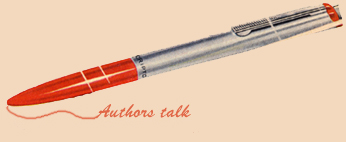

..........................................................................................................................................................................................
Susan Lee
Author of GENUINE HAUNTED HOUSE (Atlantic Bridge Pub.), BEGINNINGS - STORIES OF CANADA'S PAST (Rosdale Press), to name a few.
..........................................................................................................................................................................................
What drove/inspired you to get started?
I was a contemporary artist before this and, though I continue to work in this area, the birth of my first child and my reintroduction to children's literature really excited me. I decided that I wanted to try my hand at that.
Do you have any specialized training?
I have an honors degree from The Ontario College of Art and I took two courses with The Institute for Children's Literature.
Has this been something you've always wanted to do?
No. Have there been any obstacles along the way? Lots. Little time, a total lack of knowledge about how the industry worked (this is thankfully not the case any longer), learning that rejection is a part of the game and not to take it personally.
Before you got the all important contract how did your friends and family react to your goals? Were they supportive?
My husband has always been supportive. Most of my friends are supportive and happy for me when I sell something. There are always those who pooh-pooh the work and in a variety of ways ask when I'm going to do something serious.
Now that you have a book/books in print, do you get different reactions from friends and family?
Nah. Those who supported me before still do and those that didn't still don't.
How did you land that very first book deal?
My short story was chosen to be in a book of YA short stories. Since then I have sold more short stories and non-fiction magazine work. I have an ebook that was first published by Wordbeams.com and is now with Atlanticbridge.com. In both of those cases I sent them the full manuscript and they accepted it.
Did you have any misconceptions in the beginning about the whole book process?
I thought that it would be a lot easier than it is.
How would you describe your work? What's the most important thing you'd like others to get out of it?
My work covers the full gamut of children's literature. I write stuff for young children, fiction and non-fiction, middle-grade fiction, and edgier YA short stories and YA sci-fi novels. As well I am an illustrator and though I have not yet sold a book which I have illustrated this is something I am actively pursuing. The most important thing I would like others to get out of it is a sense of enjoyment and, when I have something important to say I hope this gets through.
Do you have an agent? If yes, please explain how you acquired your agent and how do you think having one has helped you? If you don't have an agent, would you consider getting one?
No but I would love to have one.
Describe your relationship with your editor (art director if applicable).
I have found all of the editors I have worked with extremely professional. Their input has always improved the work.
How do you most often communicate with your publisher--e-mail, phone, or snail mail?
What books do you have in the works now?
I have just finished a YA sci-fi novel set in the not to distant future. As well I have an illustrated picture book based on a retelling of the fish with a wish story making the rounds, and another YA novel going into its second draft soon.
Is there anything you'd do differently with your new projects?
No.
What's the best thing about publishing a book? What's the worst?
The best thing is seeing the finished book or article. The worst thing is to reread it and think about the things that could have been improved.
Any last words of encouragement for beginners?
Join SCBWI. Join a critique group if you can. Read all you can about the industry. Take courses and go to conferences. Offer to help at conferences--you meet wonderful people that way. Get used to getting rejection slips and don't allow them to make you question your abilities. Consider each rejection as a step that's taking you closer to a sale. Research your market and make sure you are sending your work to the right places.
![]()